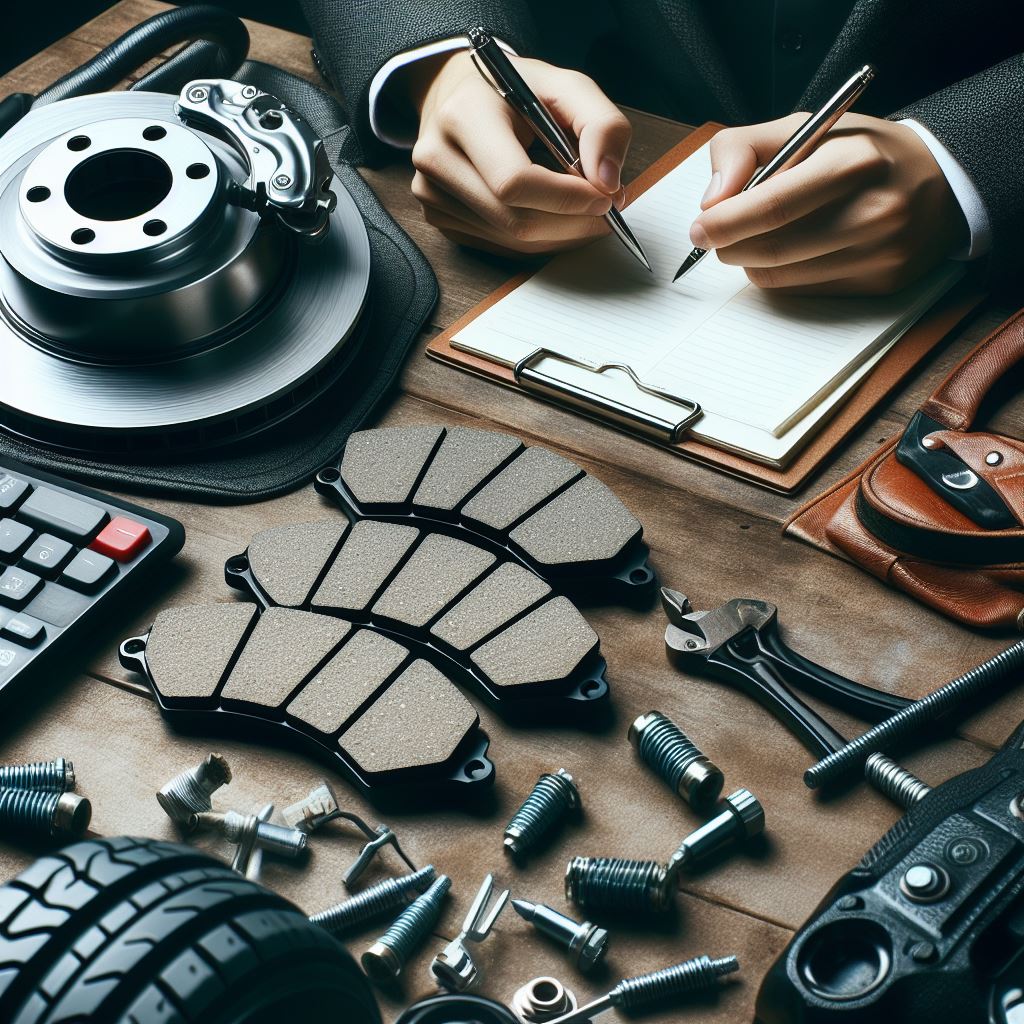All About Brake Rotors: Discover Their Purpose In Your Car
Brake rotors are an important component of your vehicle’s braking system and play a vital role in keeping you safe. When the brakes are applied, friction is created between your brake pads and rotor, which generates heat.
The rotors help dissipate the heat so it doesn’t spread throughout the braking system. This allows for a more effective stopping power and prevents components from burning out or breaking down prematurely.
When the brake pedal is pressed, hydraulic pressure from the master cylinder forces brakes fluid down to each of the wheels, where the calipers can clamp your brake pads against either side of each rotor.
The rotors then slow down as they become clamped together by the pads while its metal construction assist in dissipating heat quickly back into its environment. This constant cycle of friction helps you to a smooth stop every time your foot needs to apply pressure on that pedal.
Table of Contents
What Are Rotors On A Car?
Rotors are thin, circular metal discs found on each wheel’s interior. When your brakes are applied, these rotors are squeezed by brake pads, which press against opposing faces of the rotor.
This creates friction, resulting in a slow and controlled stop for the vehicle. Both the disc brake pad and rotor must work together to stop your car effectively.
The design and materials used to make car rotors vary by vehicle manufacture and model. Common materials range from cast iron to carbon fiber or ceramic composite materials.
Some vehicles also have specially ventilated rotors designed with internal cooling technology to support high-performance applications like sports cars or competition vehicles to dissipate heat more efficiently as they operate at higher speeds for extended periods.
No matter what type of brakes you have on your car, understanding how rotors help you stop is essential to safe driving.
What is The Purpose Of Brake Rotors in A Car?
Brake rotors are circular discs that are essential to a car’s braking system. Their main purpose is to help slow the vehicle down when brakes are applied by providing friction between the brake pads and the wheel.
When a driver applies pressure to their brakes, the force causes the brake pads to press against the rotor, slowing down its rotation and reducing the vehicle’s speed.
Brake rotors also help to dissipate heat, reducing the risk of components burning out or breaking down prematurely. Understanding how brake rotors work and their importance is essential to keeping your vehicle safe.

The brake rotor is a vital part of the overall braking system, and it’s important to maintain them regularly. Many vehicles come equipped with wear indicators that notify drivers when the rotors need to be replaced.
When these indicators light up, it is important to inspect your brakes and replace worn or damaged components to keep your vehicle running safely. Regular maintenance, such as cleaning and checking for wear, can help you maintain your brakes in optimal condition. Brake rotors provide the friction needed to slow down a vehicle, helping to keep drivers safe on the roads.
How Do Brake Rotors Work?
The primary role of brake rotors is to convert kinetic energy into thermal energy and then slow the car down. Whenever you depress the brake pedal, it causes the brake pads to press against each rotor. As pressure builds between the two surfaces, it produces friction as your wheels slow down.
This friction creates a lot of heat, which is why your vehicle’s braking system needs to be able to handle high temperatures without breaking apart during normal operation.
The rotors remain in constant contact with the wheels until you come to a complete stop; at this point, all four rotors will have completed a full circle while providing enough friction to bring you to a halt.
Depending on how hot they become due to transferring their kinetic energy into thermal energy, these components may need replacement after frequent use. Quality products with proper maintenance should keep them in optimal condition over time.
If yours are experiencing issues such as warping or grinding, it’s best to replace them as soon as possible before any major damage can occur.
Can Bad Brake Rotors be Responsible for My Accident?
When a car is in motion, the brake rotors play an essential role in allowing the driver to slow down or stop their vehicle. Without properly functioning brake rotors, the car would not be able to come to a stop safely. Brake rotors are typically made of metal and fit onto each car wheel.
When a driver presses on the brakes, the pads press against the rotor and create friction, which slows the vehicle down.

If a driver’s brake rotors are worn out or damaged, this can cause the brakes to fail and result in an accident. If a driver is involved in an accident due to faulty brakes or brake rotors, they may be able to file a personal injury claim against the manufacturer of the car or parts.
It’s important to have an experienced attorney review the case to determine if there is a valid claim for damages.
How to Know Brake Rotors Conditions?
The first indicator of a problem with your brakes is when the warning light illuminates the dashboard. This could mean that you have low levels of brake fluid or other serious issues that need to be addressed and resolved sooner rather than later.
You may also hear strange noises such as squeaking, crunching, or screeching coming from the brakes, which could suggest a buildup of dirt or debris in them. If you notice any burning smells whenever you use your brakes, then this could mean that there is excess heat causing wear and tear on them and they will need servicing soon.
If any of these signs occur then it’s important that you get your vehicle checked by a qualified mechanic to diagnose and fix any problems as soon as possible.
One way to determine the condition of your brake rotors is to inspect them for any signs of wear and tear visually. If you can see any cracks, deep grooves, or warping on the surface of the rotor, then it’s time to replace them.
Additionally, you should check for any wobbling or vibrations when your car is in motion. If you feel a light vibration that increases when you apply the brakes, then it could be a sign of warped brake rotors. It’s also important to pay attention to any warning lights that may turn on in your dashboard, as these are often indicators for brake issues.
Frequently Asked Questions [FAQs]
1. What Happens With Faulty Brake Rotors While Driving?
Brake rotors are an essential component of a vehicle’s braking system. They provide friction to slow and stop the car when the brakes are applied. Brake rotors are made of metal and are attached to the wheel hubs.
When the brakes are applied, brake pads clamp onto the rotor, generating friction, slowing and stopping the vehicle.
When brake rotors become faulty, they can cause the braking system to malfunction. This could result in the brakes not working properly or taking longer than usual to respond. In some cases, this could lead to a serious accident if the driver cannot stop their vehicle in time.
2. How Often Should Brake Rotors Be Replaced?
Brake rotors generally last for around 50,000 miles, but this can vary depending on how well the brakes are maintained and the types of roads you drive on. If you notice any signs of wear and tear, a qualified mechanic must check your brake rotors as soon as possible. It’s also a good idea to have your brake rotors inspected every 12,000 miles to ensure they are in good condition.
3. Can Bad Brakes Cause Accidents?
The thought of brake failure is undoubtedly scary, but the good news is that it’s a relatively rare occurrence. In the United States, only about 5% of car accidents are caused by brake failures annually. Although 5.6 million car crashes happen yearly, brake failure is responsible for approximately 300,000 incidents annually.
4. How Long Do Bad Brake Rotors Last?
The lifespan of your rotors depends on various factors, but typically, they will need to be replaced after driving between 30,000 and 70,000 miles. If you drive an average of 12,000 miles annually, you may need to replace your brake rotors anywhere between 2 1/2 to 6 years of driving.
5. Does Braking Suddenly Damage The Car?
It is essential to hit the brakes to prevent a possible collision. However, sudden and forceful braking can harm your car’s performance and cause damage. Let’s take a look at some of the consequences of frequent slamming on the brakes.
Conclusion
Brake rotors play an important role in the functioning of your vehicle’s brakes. If they are not kept in good condition, it can lead to serious safety issues and damage to your car. You must regularly check and maintain your brake rotors so that you can drive safely and confidently.
